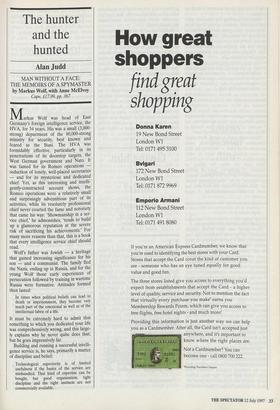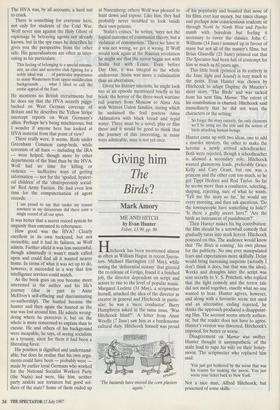The hunter and the hunted
Alan Judd
MAN WITHOUT A FACE: THE MEMOIRS OF A SPYMASTER by Markus Wolf, with Anne McElvoy Cape, £17.99, pp. 367 Markus Wolf was head of East Germany's foreign intelligence service, the
HVA, for 34 years. His was a small (3,000- strong) department of the 80,000-strong ministry for security, best known and feared as the Stasi. The HVA was formidably effective, particularly in its penetrations of its doorstep targets, the West German government and Nato. It was famed for its Romeo operations seduction of lonely, well-placed secretaries — and for its mysterious and dedicated chief. Yet, as this interesting and intelli- gently-constructed account shows, the Romeo operations were a relatively small and surprisingly adventitious part of its activities, while its resolutely professional chief never courted the fame and notoriety that came his way: 'Showmanship in a ser- vice chief,' he admonishes, 'tends to build up a glamorous reputation at the severe risk of sacrificing his achievements.' For many more reasons than that, this is a book that every intelligence service chief should read.
Wolf's father was Jewish — a heritage that gained increasing significance for his son — and a communist. The family fled the Nazis, ending up in Russia, and for the young Wolf those early experiences of persecution followed by training in wartime Russia were formative. Attitudes formed then lasted:
In times when political beliefs can lead to death or imprisonment, they become very much part of the emotional as well as of the intellectual fabric of a life.
It must be extremely hard to admit that something to which you dedicated your life was comprehensively wrong, and this large- ly explains why he never quite does that; but he goes impressively far.
Building and running a successful intelli- gence service is, he says, primarily a matter of discipline and belief:
Technological superiority is of limited usefulness if the basics of the service are mishandled. That kind of expertise can be bought, but good organisation, tight discipline and the right instincts are not commercially available.
The HVA was, by all accounts, a hard nut to crack.
There is something for everyone here, not only for students of the Cold War. Wolf never sins against the Holy Ghost of espionage by betraying agents not already known, but in the spy cases he describes he gives you the perspective from the other side. His generalisations are often as inter- esting as his particulars:
This feeling of belonging to a special commu- nity, an elite and secretive club fighting for a noble ideal was . . . of particular importance to many Westerners from upper-middle-class backgrounds . . . what I liked to call the erotic appeal of the East.
He mentions no British recruitments but he does say that the HVA secretly piggy- backed on West German coverage of Britain and he describes the Yellow Stripe intercept reports on West Germany's allies. Perhaps he's being mischievous, but I wonder if anyone here has looked at HVA material from that point of view?
There really were, it seems, Reds under Greenham Common camp-beds, while terrorists of all hues — including the IRA — were helped, though more by other departments of the Stasi than by the HVA. Wolf had no time for killing or violence — ineffective ways of getting information — nor for the 'spoiled, hysteri- cal children' of the 'obstreperously social- ist' Red Army Faction. He had even less time for the computerisation of agent records:
I am proud to say that under my tenure nowhere in my directorate did there exist a single record of all our spies.
It was better that a secret record system be ungainly than entrusted to cyberspace.
How good was the HVA? Clearly excellent in its own backyard, but not invincible, and it had its failures, as Wolf admits. Farther afield it was less successful, though admittedly it wasn't much called upon and could find all it wanted nearer home. In terms of what it was set up to do, however, it succeeded in a way that few intelligence services could match.
As the book goes on you become more interested in the author and his life's journey (due in part to Anne McElvoy's self-effacing and discriminating co-authorship). The hunted became the hunter and. then again the hunted as the war was lost around him. He admits wrong- doing where he perceives it, but on the whole is more concerned to explain than to excuse. He and others of his background were incapable, he says, of seeing socialism as a tyranny, since for them it had been a liberating force.
His position is dignified and understand- able, but does he realise that his own argu- ments could have been — probably were made by earlier loyal Germans who worked for the National Socialist Workers Party (the Nazis) and were, like him, neither party zealots nor torturers but good sol- diers of the state? Some of them ended up at Nuremberg; others Wolf was pleased to hunt down and expose. Like him, they had probably never troubled to look inside their own prisons.
`Stalin's crimes,' he writes, 'were not the logical outcome of communist theory, but a violation of communism.' There we have it: it was not wrong, we got it wrong. If Wolf would look again at the Russian revolution he might see that the terror began not with Stalin but with Lenin. Even before Day One, it was integral .to the whole endeavour. Stalin was more a culmination than an aberration.
Given his literary interests, he might look too at an episode mentioned briefly in his book: the horror of the three-week wartime rail journey from Moscow to Alma Ata with Writers Union families, during which he sustained the frail poetess Anna Alchmatova with black bread and tepid water. There must be a novel, play or film there and it would be good to think that the journey of this interesting, in many ways admirable, man is not yet over.



























































 Previous page
Previous page